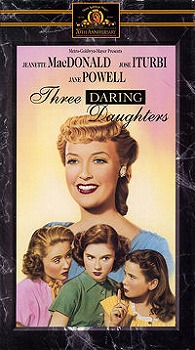| Three Daring Daughters | |
|---|---|
 VHS cover | |
| Directed by | Fred M. Wilcox |
| Written by | Albert Mannheimer Frederick Kohner Sonya Levien John Meehan |
| Produced by | Joe Pasternak |
| Starring | Jeanette MacDonald José Iturbi Jane Powell Edward Arnold Harry Davenport |
| Cinematography | Ray June |
| Edited by | Adrienne Fazan |
| Music by | Herbert Stothart Lothar Perl |
Production company | |
| Distributed by | Loew's Inc. |
Release date |
|
Running time | 115 minutes |
| Country | United States |
| Language | English |
| Budget | $2,538,000 [1] [2] [3] |
| Box office | $2,659,000 (Domestic earnings) [1] $1,351,000 (Foreign earnings) [1] |
Three Daring Daughters (UK title: The Birds and the Bees) is a 1948 American Technicolor musical film directed by Fred M. Wilcox and starring Jeanette MacDonald, Jane Powell and Edward Arnold. It was produced and released by Metro-Goldwyn-Mayer. The screenplay was written by Albert Mannheimer, Frederick Kohner, Sonya Levien and John Meehan.